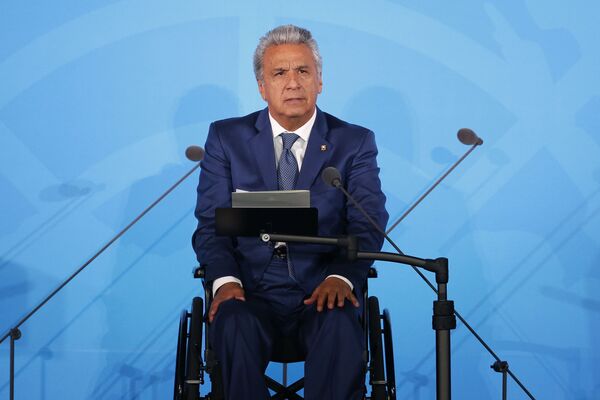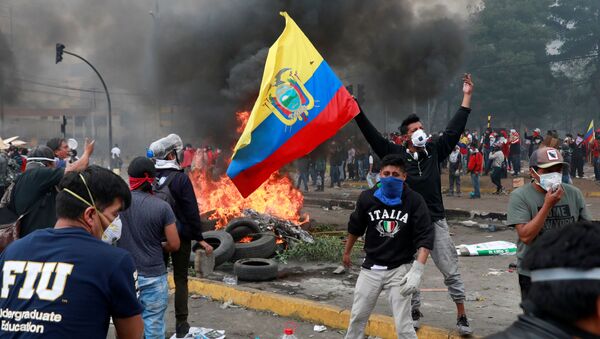October protests in Ecuador, triggered by Quito's decision to eliminate a forty-year subsidy on fuel prices, forced the country's government to backpedal on the unpopular austerity reform.
Instead, on 18 October, Ecuadorian President Lenin Moreno proposed a new tax on companies with annual revenue of more than $1 million. Under the new plan Ecuadorians with a yearly income above $100,000 will not be able to deduct personal expenses from their income tax.
"We will ask those who have more to pay more", Moreno said.
Additionally, on 6 November, the president announced a set of economic measures mostly aimed at supporting the country's agricultural sector. The initiative includes new loans for farmers, nationwide weekly fairs ("De la mata a la mesa"), reopening of rural schools as well as reviewing the "discriminatory" Bachelor test (el Examen Ser Bachiller) for secondary students.
Moreno's Concessions are Drop in the Bucket
Moreno's decision to cut fuel subsidies was made as part of an austerity plan agreed upon by Quito and the International Monetary Fund (IMF) to get a $4.2 billion loan as well as receive an additional $6 billion from the World Bank, the Inter-American Development Bank, and the CAF Andean development bank.
According to the Financial Times, the elimination of fuel subsidies would have saved Quito $1.3 billion a year, or 1.2 percent of gross domestic product (GDP). For comparison's sake, the recently announced tax reform may raise just $532 million over three years.
One way or another Moreno has to deliver on his promise to meet IMF three-year targets "to reduce debt-to-GDP ratio" through a combination of:
· a wage bill realignment;
· optimisation of fuel subsidies;
· a reprioritisation of capital and goods and services spending;
· and a tax reform.
Professor Fabio Sobral, who teaches ecological economy at the Federal University of Ceara, Brazil, believes that Quito's concessions to Ecuadorians are just a drop in the bucket since they will be accompanied by new austerity policies.
"The elevation of fuel prices was a central demand of the austerity plan of the IMF to the granting of a loan to the country", Sobral highlights. "With this measure the Ecuadorians saw the return of the multinational domination over their natural resources, while also being the return of a period of exploitation of the population through inflationary elevation, which would be the immediate consequence. The IMF has worked to dismantle the small social protection adopted in the period of President Rafael Correa".
The professor stresses that the IMF's primary objectives are "the recovery of the profit margins of international corporations" and "control of the Ecuadorian governmental powers".
"The IMF will not give up on its objective of transferring profits to the international corporative and financial sector", the academic says. "That is why the loan and the austerity plan [are] essential to its objectives".

Lenin Moreno Lost People's Support & 'Utility' for Foreign Powers
While the professor is expecting Quito to push ahead with more unpopular measures to meet the IMF's demands, he notes that Moreno's positions have been seriously undermined during the protests.
"The government is under 'surveillance' and has lost popular support", the Brazilian academic emphasises. "Even if it tries to regain its prestige through wealth distribution measures the Ecuadorian people will know that it's because of its strength that such measures are taken. It won't be a genuine action. Lenin Moreno has lost at the same time the support of the people and his utility to the international powers".
According to Telesur, a Caracas-based satellite television network, a recent survey conducted by the company Perfiles de Opinion indicated Wednesday that 73.85 percent of Ecuadorians disapprove of President Lenin Moreno's policies.
"Ecuadorian society is in a profound standoff: on one side the Moreno government. worn out and hated; on the other side, the Ecuadorian population that sees the enemy, but still hasn't been capable of reconstructing an alternative", Sobral presumes.
The Brasilian academic foresees that a further standoff is "inevitable" and a recent publication by Ecuadorian magazine Vistazo appears to confirm his prognosis.
On 6 November, Vistazo reported that the Popular Front is going to hold a nationwide rally on 15 November against new tax reforms and the government's budget prognosis for 2020. Having said that the national mobilisation facilitated the revocation of the decree eliminating fuel subsidies, the organisation's leader, Juan Cervantes, made it clear that this tool would be used again by Ecuadorian workers to exert pressure on the country's government.




